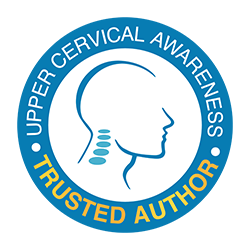
The Origin of the Problem
Dizziness and vertigo are prevalent conditions. These conditions are commonly attributed to originating from issues in the eyes or inner ears. Therefore, treatment is focused on treating either the eyes or inner ears. However, dizziness and vertigo often originate from issues in the upper neck. Therefore, many patients receiving treatment for the incorrect source of their symptoms will continue to suffer.
The upper neck is a common site of origin for dizziness and vertigo because the neck affects the body’s balance system. The balance system refers to the entire group of structures and nerves that provide the information needed to experience balance and orientation. There are three main senses that are part of this system.
Eyesight
Eyesight provides about 10% of the information about orientation to the environment. Eyesight helps a person get their bearings in relationship to the environment. However, the balance system can adapt without eyesight. Even blind people can have exceptional balance without experiencing dizziness.
Inner Ears
The inner ears have specially designed semicircular canals that fluid flows through. These canals have small stones that move with the flow of the fluid. When the head moves, the fluid flow moves these stones. This motion produces a nerve signal that tells the brainstem that the head is moving. These signals are designed to tell the brain where the head is and how fast it is moving in any given direction. These inner ear semicircular canals provide about 20% of all information needed for balance.
Complimentary Vertigo Consultation
We’d love to meet you for a 15-20 minute session with a doctor to get your story, conduct any preliminary tests, and see if we can help you. If so, great, if not, we’ll help you find the place that can.
Proprioception
There are special nerves that are located throughout the entire body called proprioceptors which tell the brain how the body is positioned. The information from these nerves provide a spatial awareness. About 70% of the information in the balance system comes from these proprioceptors. The most sensitive proprioceptive area of the body are in the muscles and joints of the upper neck because these proprioceptors tell the brain where the head is positioned.
Mismatched Signals
These three nerve signal inputs (the eyes, inner ears and proprioceptors) all send their signals to a structure called the vestibular nucleus, which is the balance center of the body. This vestibular nucleus is located in the brainstem, between the base of the brain and top of the neck in an area called the craniocervical junction.
In order to feel balanced, the three signal inputs need to match. While standing upright, the information from the eyes need to match the joint position sensors of the neck. If the head is tilted, the eyes and neck joint proprioceptors should be telling the vestibular nucleus that your head is tilted the same amount. If the head is turned to the right, the proprioceptors and inner ears should send the same information about how far the neck has turned. If the signals match, balance is maintained even throughout head or body motion.
However, if there is a mismatch of these nerve signals, a person will experience a sense of dizziness. For example, if the eyesight says that the head is straight with the horizon, but the proprioceptors say it is tilted to the side, that person will feel dizzy. If the upper neck proprioceptors send signals telling the balance center that the head turned 10 degrees to the left, but the inner ears send signals saying it is 20 degrees to the left, that person will feel dizzy. If the mismatch is bad enough, it can become as severe as vertigo.
Locating the Origin
In order to find the root of the dizziness, it is critical to identify the location of the signal problem. Once the origin of the problem is identified, if can be successfully corrected. Since proprioceptors play the largest role in our sense of balance (up to 70% of the information), this is a critical place to start. Due to the sensitive nature of these upper neck bones and nerves, the most critical area to examine is the craniocervical junction. Unfortunately, many balance clinics and EENT providers do not evaluate or treat this critical area. This is where upper cervical care come in.
Correcting the Root Cause
Many people suffering from dizziness and vertigo have a misalignment in their craniocervical junction leading to improper proprioception in their balance center. Many of these people suffer for years before having their craniocervical junction evaluated.
Upper cervical chiropractors are uniquely trained to evaluate and correct misalignments of the craniocervical junction. A unique neurological examination is performed and specific images of the upper neck are taken to evaluate the craniocervical junction. If a misalignment is found causing nerve signal interference, the upper cervical doctor carefully corrects the misalignment using extremely gentle and precise corrective procedures. This allows the proprioceptive signals to return to normal and the sense of balance to begin to improve.
Upper cervical care has been shown to help many people with dizziness and balance issues.
How Our Vertigo Care Plan Works
1. Real Answers
You have a story and we want to hear it. We want to understand you. If we feel we can help, we’ll complete a very detailed exam–unlike anything you’ve done anywhere else to get to the root cause of your vertigo.
2. Real Solutions
Once we’ve gotten to the bottom of things–the root cause–we’ll tailor-make a program of care first to stop the damage and turn things around, then continue to move your health and function in a constructive direction.
3. Real Life
At the end of the day, you want your quality of life back. Better. Stronger. Healthier. We desire to help you achieve the life that God has called you to–getting you back to your sense of purpose and joy.
Common Causes of Vertigo in Mount Dora, FL
Cervicogenic Vertigo
This type of vertigo is caused by dysfunction in the neck (cervical spine) and, even more specifically, the upper neck (craniocervical junction). This form of vertigo is characterized by dizziness or spinning, often accompanied by stiffness and neck pain. In this case, sensory input from the neck (via proprioceptors that detect position sense) can have a mismatch from sensory input coming from the eyes and inner ears—this mismatch of incoming messages causes dizziness or vertigo.
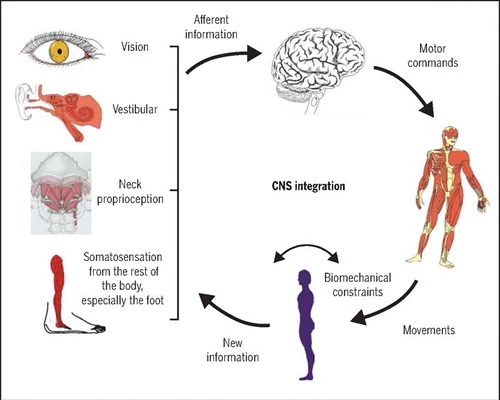
Origin of the Problem:
- Eyesight- 10% of the information about orientation to the environment
- Inner Ears– semicircular canals provide about 20% of all the information needed for balance and orientation
- Proprioception– special nerves throughout the body which tell the brain how the body is positioned. About 70% of the information in the balance system comes from these proprioceptors. The most numerous and sensitive are those found in the upper neck.
Benign Paroxysmal Positional Vertigo (BPPV)
This is a very common cause of vertigo caused by small calcium or crystal particles within the inner ear. BPPV will typically produce brief episodes of vertigo when the individual changes the position of their head and neck. This particular cause of vertigo will generally respond well to the “Epley Maneuver”—a simple positional exercise you can do to reposition the crystal particles in the inner ear.
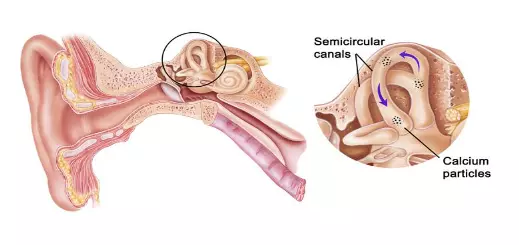
Meniere’s Disease
This type of condition may also be accompanied by tinnitus (ringing in the ears), hearing loss, and bouts of vertigo. Meniere’s disease is caused by a chronic inner ear disorder. Upper Cervical Specific Chiropractic care can significantly impact this condition due to the proximity of the nerves and blood vessels in the upper neck, which can influence the inner ear.
Vestibular Neuritis
This form of vertigo is caused by an inflammation/irritation of the vestibular nerve, which helps to control eye movement, balance, and sense of position. It can cause sudden and severe bouts of vertigo, which may accompany nausea and vomiting. Again, as with Meniere’s, Upper Cervical Specific Chiropractic care can positively impact this condition due to the proximity of the vertebrae in the upper neck to the vestibular nucleus, which may be irritated due to the spinal misalignment.
Head Injury
Trauma to the head, such as a concussion, can affect the inner ear or parts of the brain involved with balance and position, thus causing vertigo symptoms. *It is important to note that head trauma is one of the primary causes of misalignment (subluxation) of the upper neck. It is essential to be evaluated by an Upper Cervical Chiropractor to rule out this condition and treat it appropriately.
Medications
Some medications, such as anticonvulsants and even antibiotics, can have a side-effect of vertigo—speak with your prescribing physician about possible side-effects of your medication(s).
Anxiety and Panic Disorders
It may be difficult to fathom, but even psychological factors can contribute to vertigo and dizziness. It should also be noted that the medications sometimes used to treat these issues may have dizziness as a side effect.
Acoustic Neuroma
An acoustic neuroma is a type of growth (non-cancerous) on the vestibular nerve that can cause ringing in the ears, hearing loss, and vertigo.
Of course, there are plenty of medications to help with vertigo symptoms, but Upper Cervical Chiropractic care is one of the best all-natural approaches to address the causes of vertigo, helping to reduce symptoms and prevent recurring flare-ups.
How We Treat Vertigo in Mount Dora, FL
Comprehensive Consultation and Exam
The doctor and team will first do a consultation and preliminary vertigo evaluation (complimentary) to ensure you’re in the right place and that we believe we can help you. If we can help, we’ll dive deeper into your vertigo condition and how it affects your life. Once we understand you clearly, we’ll thoroughly examine your spine and nervous system utilizing chiropractic, functional, and neurologic testing to find the root cause of your vertigo.
CBCT (3D Panoramic X-ray) and Motion Study X-rays
Once we’ve determined that you are a good candidate for care, we will likely need to take precise forms of imaging to pinpoint the problem (unless you are pregnant). We want to get a good look at the curve of the spine, the alignment (or lack thereof), any degenerative changes, contraindications to care, and ultimately find out EXACTLY what we need to do for you to get better.
Specific Chiropractic Care in Mount Dora, FL
Our family-oriented practice in Mount Dora provides a very specific and unique form of Chiropractic care that is precise, extremely effective, and very gentle. In fact, there is no twisting or “cracking” of your neck. Utilizing a form of care known as Blair Upper Cervical, which focuses on the top two bones in the neck, where your head and neck come together, which tends to yield uncommon results due to the neurological influence of this critical area of your spine. We add a supportive type of adjusting for the rest of your spine known as TRT (Torque Release Technique). This is also a precise and effective yet gentle instrument-based technique that produces fantastic results.
When the joints of your spine are misaligned, it puts pressure on the joints and, more importantly, on your nervous system. A misalignment—known as a subluxation—may cause pain but also can affect your global health. The goal of your specific adjustments is to reduce the Subluxations, taking pressure off your spine and nervous system so that your body can self-heal the way it was created to.
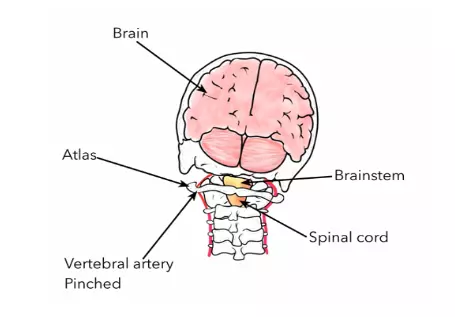
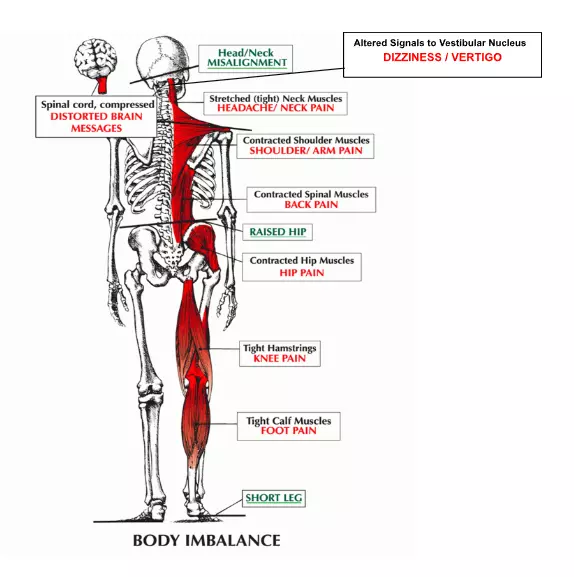
Custom Therapeutic Exercise Plan
Depending on your particular case, we will design a custom rehab/exercise plan to help you recover quicker and, most importantly, attain lasting results. Your unique exercise plan aims to help restore global spinal and vestibular imbalances, address muscle weakness, increase range of motion, improve your posture and reduce your vertigo symptoms. We want to keep it simple—so you can do it at home in very little time.
Check Out Our Location Near You
2255 Crescent St Mt Dora, FL 32757
Frequently Asked Questions
How do I know if I should see a chiropractor for dizziness or vertigo?
If you have unresolved dizziness or vertigo attacks that haven’t responded to other treatments or home care, getting a proper upper cervical chiropractic spinal evaluation would be prudent. Also, if you have accompanying headaches, neck pain, upper back or shoulder pain, or muscle tension, these are red flags for spinal/structural issues best addressed by a great chiropractor.
Is a massage or chiropractic better for vertigo?
Both are great but serve different purposes. Massage primarily focuses on the soft tissues (muscles, fascia), improving circulation and reducing stress, whereas chiropractic focuses on the neuro-structural system (the spinal joints and adjacent nerves). Because a chiropractic adjustment affects the nervous system, it will also directly affect muscle tension. Massage is a wonderful compliment to chiropractic care, but not a replacement for it.
What can I do in the meantime to relieve vertigo symptoms?
We recommend avoiding medications unless absolutely necessary—but instead utilize cold packs to reduce inflammation around the joints, nerves, and muscles (10-15 mins every hour as needed to the upper neck/base of the skull). You can alternate hot and cold but end with cold. Stay well hydrated—approximately half your body weight in ounces of water. Stay mobile (within current limitations), as mobility is beneficial for joint health and flushing out the inflammation along with your water intake. These tips will help with your vertigo symptoms until the cause is corrected.
If the cause of your vertigo is the malposition of calcium crystals in the inner ear (BPPV), you may try performing the “Epley Maneuver” at home. We have some resources on this site on how to perform it; you can also view videos on YouTube on the procedure. It is fairly simple to perform, but it is best to do it with someone to assist you. If you’re not comfortable performing on your own, consult a health professional to assist you. If you do not find vertigo relief from performing this exercise, then you likely have a cause unrelated to calcium crystals in the inner ear. Our advice would be to seek professional help to find the cause.
How should I sleep with vertigo?
The best posture to sleep in if currently symptomatic is semi-recumbent (as in a recliner chair) with support under your neck. Some contoured pillows are good (some are terrible)—we recommend the Killapilla—or simply roll a small towel under your neck. If you can lie flat in bed, put a pillow under your knees to help achieve a more neutral spinal posture. If on your side (avoid the “bad side”), it’s important to have just the right amount of pillow height so that your head is not tilted up or down, which will only irritate your neck joints and receptor nerves, possibly aggravating your vertigo symptoms.
Does a chiropractic adjustment hurt?
No, a chiropractic adjustment should not hurt. Some technique models use more force to move the vertebrae where there may be an audible “cracking” or “popping” sound. This is just gas escaping the joint and nothing to be afraid of. In our office, we utilize a very specialized form of care that does not involve any twisting or “cracking” of your spine—it is very gentle, very precise, and extremely effective at producing results. You can learn more about “Upper Cervical” chiropractic care on our page.
Complimentary Vertigo Consultation
We’d love to meet you for a 15-20 minute session with a doctor to get your story, conduct any preliminary tests, and see if we can help you. If so, great, if not, we’ll help you find the place that can.




